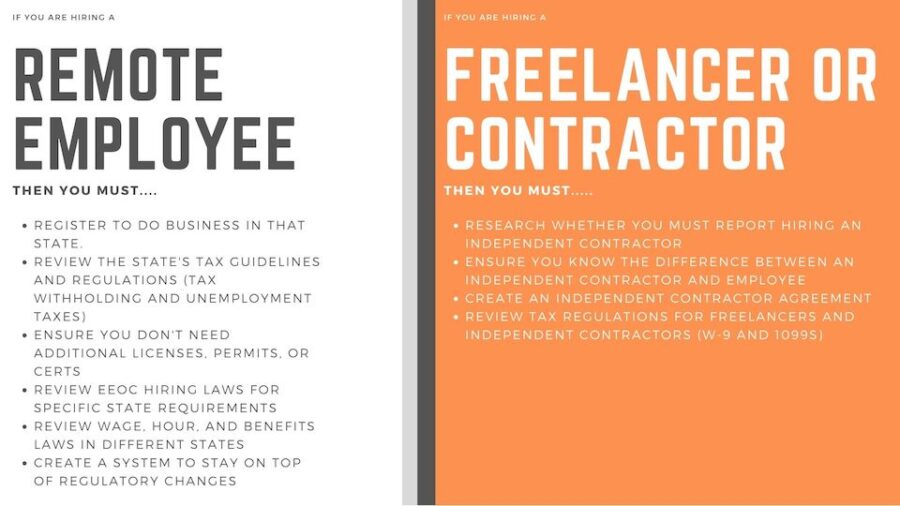The job market has shifted significantly in recent years. The accelerated adoption of technology has not only pushed many companies into remote working arrangements but also increased the availability of supporting tools and technologies (i.e., video conferencing and collaboration software).
Since the start of large-scale remote work, many companies have implemented remote policies and established strong foundations to support them. Although certain industries have adapted better than others, the trend toward remote work has continued to gain momentum as employees seek greater workplace flexibility. With continued success and a large-scale push for remote work, the idea of hiring out of state has blossomed.
Benefits of Hiring Out of State
Hiring across state lines offers a number of advantages to employers. With access to a larger talent pool, businesses can find candidates who may not be available in the local job market. Additionally, expanding outside the local area can help employers avoid any potential bias or lack of diversity in their hiring process. By widening your search, you open yourself up to candidates who bring new experiences and perspectives that may not have been available locally.
Another benefit to hiring out of state is cost savings for both employer and employee alike. With remote work becoming more commonplace, companies no longer need to pay for costly relocation expenses as often as they used to. Employees also don’t need to worry about packing up their lives and moving cross-country just to take a job—they can simply stay put while still enjoying the same benefits as an in-state employee.
Why are employers so hesitant?
Now let’s be clear. When we are talking about hiring an employee from another state, we are not talking about the ones that are willing to relocate. We are talking about the ones who live in another state and plan to stay there. Maybe they live on the state border (with an easy commute to work). Maybe they are even applying for one of your remote positions. The fact of the matter is learning how to hire an out-of-state employee is no walk in the park.
After operating your business for so long, you know exactly how to hire, pay, onboard, and terminate employees legally. However, hiring someone from another state may throw a few curveballs your way. Everything you already know hardly matters.
Legal Matters
The biggest reason many small- to medium-sized companies refrain from hiring an employee from another state is that it is legally taxing. As an employer, you must register your company in any state you plan to hire employees. Not only will you be obligated to comply with your local and state laws, but you must research the other state’s laws as well.
Remote Employee vs. Independent Contractor
On the other hand, you may consider hiring an independent contractor or freelancer as an easy alternative. This is a great way to expand your candidate pool and hire out of state without complex legal tasks.

Navigating Out-of-State Hires
If you’re considering expanding your search beyond your local area, here are five tips on how you can make sure you’re making smart decisions:

Research Your Local and State Regulations
Every state has its own regulations when it comes to employment law, so make sure you understand what those are before extending an offer across state lines. Make sure you familiarize yourself with things like tax laws, payroll compliance requirements, and any other legal obligations specific to where your candidate resides.

Collect and Check References Carefully
You will likely get fewer chances to evaluate the candidate face-to-face. So, it’s vital to thoroughly collect and check their references. Make sure you take advantage of asynchronous and synchronous video interviewing technology to get a better sense of who your candidate is. Depending on the seniority of the position, it is advisable to use these tools with references and candidates.

Vet Their Technology Skills
If your candidate will be working remotely from another location, it’s essential that they have the necessary technical skills needed for success in a remote role. This includes familiarity with common communication platforms like email and video conferencing software like Zoom or Skype. Ask questions about their experience using such tools during the interview process and consider administering basic technical tests before extending an offer.

Don’t Hire an Out-of-State Employee Until You’re Ready
First things first… Do not hire an out-of-state employee until you are ready. Hiring out of state requires a lot of paperwork, knowledge about laws and regulations, and a commitment to staying updated as laws change. You have to do a lot of groundwork to create a system that is ready to support your decision.

Consider Contractors Instead of Full-Time Employees
If you’re concerned about unfamiliarity with out-of-state laws or compliance issues related to taxes or payroll processing, consider hiring freelancers or contractors instead. You may find that doing this is much easier (and more profitable).
If you’d like to hire out-of-state employees one day, start with contractors while you build a suitable system for managing out-of-state employees. This way, you give yourself time to sort through your concerns, and there is less risk involved in working with contractors in the meantime.
Hiring across state lines offers many advantages both for employers and employees. However, it does come with certain risks if employers do not do their due diligence before proceeding. With these five steps in mind, employers should feel more confident navigating this process with ease! Once you’re ready, post your first free job on Job\Searcher.






